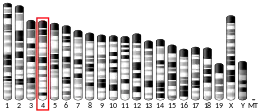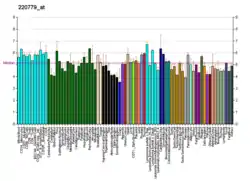PADI3
Peptidyl arginine deiminase, type III, also known as PADI3, is a protein which in humans is encoded by the PADI3 gene.[5][6]
| PADI3 | |||||||||||||||||||||||||||||||||||||||||||||||||||
|---|---|---|---|---|---|---|---|---|---|---|---|---|---|---|---|---|---|---|---|---|---|---|---|---|---|---|---|---|---|---|---|---|---|---|---|---|---|---|---|---|---|---|---|---|---|---|---|---|---|---|---|
| Identifiers | |||||||||||||||||||||||||||||||||||||||||||||||||||
| Aliases | PADI3, PAD3, PDI3, peptidyl arginine deiminase 3, UHS1 | ||||||||||||||||||||||||||||||||||||||||||||||||||
| External IDs | OMIM: 606755 MGI: 1338891 HomoloGene: 7882 GeneCards: PADI3 | ||||||||||||||||||||||||||||||||||||||||||||||||||
| |||||||||||||||||||||||||||||||||||||||||||||||||||
| |||||||||||||||||||||||||||||||||||||||||||||||||||
| |||||||||||||||||||||||||||||||||||||||||||||||||||
| |||||||||||||||||||||||||||||||||||||||||||||||||||
| |||||||||||||||||||||||||||||||||||||||||||||||||||
| Wikidata | |||||||||||||||||||||||||||||||||||||||||||||||||||
| |||||||||||||||||||||||||||||||||||||||||||||||||||
This gene encodes a member of the peptidyl arginine deiminase family of enzymes, which catalyze the post-translational deimination of proteins by converting arginine residues into citrullines in the presence of calcium ions. The family members have distinct substrate specificities and tissue-specific expression patterns. The type III enzyme modulates hair structural proteins, such as filaggrin in the hair follicle and trichohyalin in the inner root sheath, during hair follicle formation. Together with the type I enzyme, this enzyme may also play a role in terminal differentiation of the epidermis. This gene exists in a cluster with four other paralogous genes.[5]
See also
References
- ENSG00000142619 GRCh38: Ensembl release 89: ENSG00000280549, ENSG00000142619 - Ensembl, May 2017
- GRCm38: Ensembl release 89: ENSMUSG00000025328 - Ensembl, May 2017
- "Human PubMed Reference:". National Center for Biotechnology Information, U.S. National Library of Medicine.
- "Mouse PubMed Reference:". National Center for Biotechnology Information, U.S. National Library of Medicine.
- "Entrez Gene: PADI3 peptidyl arginine deiminase, type III".
- Kanno T, Kawada A, Yamanouchi J, Yosida-Noro C, Yoshiki A, Shiraiwa M, Kusakabe M, Manabe M, Tezuka T, Takahara H (November 2000). "Human peptidylarginine deiminase type III: molecular cloning and nucleotide sequence of the cDNA, properties of the recombinant enzyme, and immunohistochemical localization in human skin". The Journal of Investigative Dermatology. 115 (5): 813–23. doi:10.1046/j.1523-1747.2000.00131.x. PMID 11069618.
Further reading
- Vossenaar ER, Zendman AJ, van Venrooij WJ, Pruijn GJ (2004). "PAD, a growing family of citrullinating enzymes: genes, features and involvement in disease". BioEssays. 25 (11): 1106–18. doi:10.1002/bies.10357. PMID 14579251. S2CID 22194514.
- Chavanas S, Méchin MC, Nachat R, et al. (2006). "Peptidylarginine deiminases and deimination in biology and pathology: relevance to skin homeostasis". J. Dermatol. Sci. 44 (2): 63–72. doi:10.1016/j.jdermsci.2006.07.004. PMID 16973334.
- Rus'd AA, Ikejiri Y, Ono H, et al. (1999). "Molecular cloning of cDNAs of mouse peptidylarginine deiminase type I, type III and type IV, and the expression pattern of type I in mouse". Eur. J. Biochem. 259 (3): 660–9. doi:10.1046/j.1432-1327.1999.00083.x. PMID 10092850.
- Kanno T, Kawada A, Yamanouchi J, et al. (2000). "Human peptidylarginine deiminase type III: molecular cloning and nucleotide sequence of the cDNA, properties of the recombinant enzyme, and immunohistochemical localization in human skin". J. Invest. Dermatol. 115 (5): 813–23. doi:10.1046/j.1523-1747.2000.00131.x. PMID 11069618.
- Venter JC, Adams MD, Myers EW, et al. (2001). "The sequence of the human genome". Science. 291 (5507): 1304–51. Bibcode:2001Sci...291.1304V. doi:10.1126/science.1058040. PMID 11181995.
- Strausberg RL, Feingold EA, Grouse LH, et al. (2003). "Generation and initial analysis of more than 15,000 full-length human and mouse cDNA sequences". Proc. Natl. Acad. Sci. U.S.A. 99 (26): 16899–903. Bibcode:2002PNAS...9916899M. doi:10.1073/pnas.242603899. PMC 139241. PMID 12477932.
- Chavanas S, Méchin MC, Takahara H, et al. (2004). "Comparative analysis of the mouse and human peptidylarginine deiminase gene clusters reveals highly conserved non-coding segments and a new human gene, PADI6". Gene. 330: 19–27. doi:10.1016/j.gene.2003.12.038. PMID 15087120.
- Iida A, Nakamura Y (2004). "Identification of 45 novel SNPs in the 83-kb region containing peptidylarginine deiminase types 1 and 3 loci on chromosomal band 1p36.13". J. Hum. Genet. 49 (7): 387–90. doi:10.1007/s10038-004-0156-1. PMID 15150696.
- Gerhard DS, Wagner L, Feingold EA, et al. (2004). "The status, quality, and expansion of the NIH full-length cDNA project: the Mammalian Gene Collection (MGC)". Genome Res. 14 (10B): 2121–7. doi:10.1101/gr.2596504. PMC 528928. PMID 15489334.
- Nachat R, Méchin MC, Takahara H, et al. (2005). "Peptidylarginine deiminase isoforms 1-3 are expressed in the epidermis and involved in the deimination of K1 and filaggrin". J. Invest. Dermatol. 124 (2): 384–93. doi:10.1111/j.0022-202X.2004.23568.x. PMID 15675958.
- Méchin MC, Enji M, Nachat R, et al. (2005). "The peptidylarginine deiminases expressed in human epidermis differ in their substrate specificities and subcellular locations". Cell. Mol. Life Sci. 62 (17): 1984–95. doi:10.1007/s00018-005-5196-y. PMID 16091842. S2CID 23610590.
- Dong S, Kanno T, Yamaki A, et al. (2006). "NF-Y and Sp1/Sp3 are involved in the transcriptional regulation of the peptidylarginine deiminase type III gene (PADI3) in human keratinocytes". Biochem. J. 397 (3): 449–59. doi:10.1042/BJ20051939. PMC 1533312. PMID 16671893.
- Gregory SG, Barlow KF, McLay KE, et al. (2006). "The DNA sequence and biological annotation of human chromosome 1". Nature. 441 (7091): 315–21. Bibcode:2006Natur.441..315G. doi:10.1038/nature04727. PMID 16710414.




